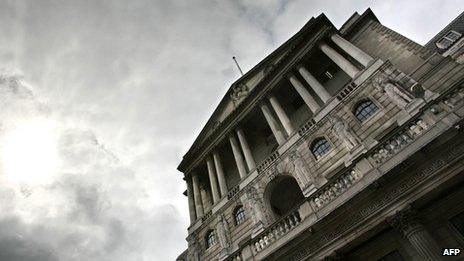Has the Bank of England loan scheme failed?
- Published
- comments

The Bank of England provided £16.5bn of cheap loans to the banks between the launch of its Funding for Lending Scheme last August and the end of March this year.
So what happened to the provision of credit by banks to UK households and businesses during those eight months?
Well, according to new statistics published on Monday by the Bank, net lending fell by £1.8bn, representing a reduction in the total stock of loans of 0.1%.
To put it another way, the banks borrowed quite a large sum, at the attractive interest rate of 0.75% - which it's not completely misleading to say is cheap money provided by us, by the state - and did not pass that money on to us.
Or so it would seem.
'Honourable mention'
But that is not quite the whole story. The Bank and the Treasury say that the banks have - in effect - transmitted the subsidy they have received by cutting mortgage rates and business-loan interest rates.
So to the extent that is so, they have increased the spending and investing power of households and businesses.
But perhaps what is most striking about the statistics is the very varied lending performance of different banks.
So, for example, Barclays and Nationwide have increased their net lending very substantially - by £6.8bn and £4.8bn respectively.
Other impressive performers were Coventry Building Society, Virgin Money and Tesco Bank, all of which boosted their lending by more than £1bn each. And Aldermore, the specialist business bank, deserves an honourable mention, having borrowed £475m from the scheme and lent £710m.
On this evidence, simpler banks and those that made fewer egregious errors in the boom years are now providing better service to the economy, by greasing its wheels with loans.
By contrast - and what a contrast - Santander borrowed £1bn and shrunk its overall lending by a striking £8.6bn.
Which doesn't of course suggest that Santander is a weak bank in the UK. But it does imply that its Spanish parent is rather keen that all its operations conserve capital and tread carefully - presumably so that the group as a whole can absorb whatever shocks may be still to come in Spain's ailing economy.
'Healthy desire'
Also Lloyds borrowed £3bn and reduced the size of its loan book by £6.6bn.
And Royal Bank of Scotland borrowed £750m, and cut its lending by £4bn.
Lloyds insists that the figures are misleading - in that it says, for example, that it has been increasing its net lending to the economically important small-and-medium-size business sector.
RBS also recently said that its "core" lending to small and medium size businesses rose 1% in the first three months of the year.
Both would say that the diminution of their lending reflects a healthy desire on their part to get out of peripheral or excessively risky activities.
But although such prudence may be good for their owners, including us in the semi-nationalised Lloyds and RBS, in the short term it will dampen economic recovery.
So here's the impossible-to-measure scary counterfactual: if the Bank of England hadn't chucked all that cheap money at the banks, how much tighter would credit have become, and how much more sluggish would our hard-to-spot economic revival have been?
Update 16:00:
There is another striking number in the latest statistical update on Funding for Lending - which is that in the latest quarter, the biggest borrower from the scheme by a wide margin was the Co-operative Bank.
This weakened bank, which is in the tortuous process of trying to fill a substantial hole in its capital resources, borrowed £900m from the Bank in the three months to 31 March - which is £400m more than any other bank borrowed in the same period, and makes the Co-op the fifth biggest debtor of the Bank under the scheme.
The Co-op is a long way from being the fifth biggest bank in Britain and this sum represents more than 2.5% of all its deposits. For the Co-op, it is a non-trivial sum.
Now in these three months, the Co-op shrunk its lending, by a tiny amount. So it either sat on the cash or used it to repay creditors and depositors who wanted their money back.
And given that the Co-op recently decided not to take on any new business customers, it is reasonable to assume that it has not gone on any kind of lending spree since.
Anyway, to state the bloomin' obvious, this loan to the Co-op by the Bank of England shows that the Bank has a powerful direct financial interest in an orderly solution to the Co-op's current difficulties.